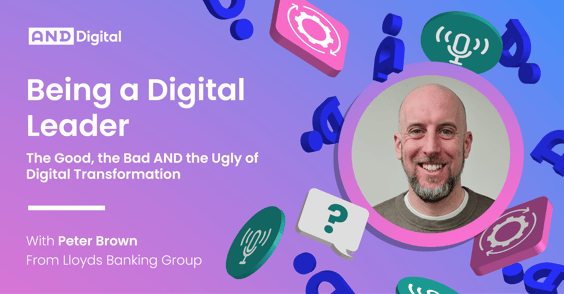Skills and Talent
Why education and business must play together in the sandbox
16 February 2023 • 7 min read

In 2022, AND Digital conducted extensive natural research into the nature and scale of the Digital Skills Gap, surveying thousands of knowledge workers, business leaders and hiring managers. While the picture that emerged was broad and complex, there was a clear theme everyone could agree on: business and education need to work better together, to benefit the current and future workforce.
Current data shows that only 14% of the workforce have the required digital skills to fill the UK’s current job vacancies. And yet, despite it being clear that businesses’ skills gaps will not be filled by hiring alone, upskilling hasn’t been the focus it should be - with 58% of workers receiving no training at all in the last year. Lack of time, commitment and budget play a huge factor in this, making it clear that businesses need greater external support.
In January 2023, we gathered a panel of experts to explore what that support might look like; focusing on the role of education and third parties when it comes to upskilling in the workplace. The panel discussed how to form mutually beneficial collaborations to aid in upskilling, and how to evolve your team’s mindset to support life-long learning for all. For those who missed it, we’re rounding up the highlights of that conversation below.
52% of people surveyed believe their organisation only sees digital upskilling as a worthwhile investment for obvious tech focused roles.
The workforce of today will shape the future of the industry and economy, meaning we can no longer stay blinkered on the ‘now’ - we need to prepare and nurture the skills of the future. To do this, businesses need to broaden their conception of what ‘digital skills’ actually are, and leverage the skillsets and opportunities presented by the full breadth of their workforce.
When it comes to the narrow view of digital upskilling just being for tech roles, Harriet Perks, Onboarding and Academy Lead at AND Digital said:
“it's like starting a race in a rowing boat of eight people, and only asking one person to ensure they win the competition”.
The successful delivery of digital products relies completely on the perfect balance of skills and perspectives across a collaborative team. It’s key that we acknowledge and build on this, and don’t just see “coders” as the single answer to digital.
Duncan Kemp, Director of Partnerships at FutureLearn, sees individualised learning at the heart of this problem. Businesses expect their people to upskill themselves in digital, often in their free time, with no support, encouragement or wider context on how to harness these skills in a team. For context, 40,000 people visited futurelearn.com in the last quarter, originally intending to study computer-focused courses, but a large proportion went on instead, to explore business and management studies. From Duncan’s perspective, this further enforces what the data shows - that the essence of the skills gap doesn’t just lie with technology, it lies in the human skills required to use technology in a team and project environment:
“A part of closing the skills gap is teaching people to use the technology, yes. But a larger part of the challenge is actually teaching them to work in teams, to work with and understand people who have to use the technologies, and to actually deliver the projects.”
Based on AND Digital’s data, if we’re to look at closing the skills gap in the next three years, the UK would require an additional 8 million digitally-skilled people. Realistically, the majority of that 8 million is going to come from upskilling and building digital fluency in the workforce, which we can break down into three key imperatives:
- Investing in continuous learning - empowering and supporting employees to stay abreast of the new and the next in terms of technology. And, even more importantly, investing in critical professional and behavioural skills to harness that technology.
- Fuelling diversity in our workforces - attracting and retaining a complement of brilliant talent from diverse backgrounds, experiences and skillsets. This will enable our people to learn more from each other, whilst designing digital products that truly respond to society’s needs.
- Increasing the focus on the talent pipeline across education - attract skilled graduates straight into roles and create new career pathways.
14% of the UK workforce have the required digital skills to fill current vacancies.
61% of leaders say that their growth outcomes depend on digital skills. So we recognise that there is an imperative for digital capabilities in the majority of businesses, but, in the pressure of the current economic climate, does anyone actually have the time and resource to invest in this?
Last year alone, there were a million more roles in the UK than there were graduates - so It’s clear that the skills gap won’t be closed by new talent any time soon. We need to look inward at our current workforce and learn how to cross skill, upskill and reskill, making tech accessible to all. We’re still fighting the assumption that, because technology is so embedded in daily life, everyone has “digital skills.” Meanwhile, 65% of over 55s say they have never received any digital upskilling, and that’s directly impacting the growing 40-60 age group looking to make career changes. With a reduction in face-to-face learning experiences due to cost-cutting, businesses need to pivot to providing easy access to bitesize learning that isn't a solitary experience, to encourage and engage their workforce.
Claire Bacall, Chief of People Evolution at AND Digital, believes that big investment doesn’t need to come from within - it can come from outside, in the shape of a partnership.
She stressed the need to build more partnerships across the community, involving organisations like FutureLearn and Next-Up. For teams under pressure to deliver on BAU, upskilling partners like these can provide specific, real-world relevant and bitesize learning, that can be continuous and easily digested around work. These on-demand partnerships are inherent to providing continuous and accessible learning across society; not just in the tech industry.
“What we're talking about here is extending our ecosystem, and removing those hard lines that separate education, work and community. By doing that, we can strengthen the digital capabilities across the board, in a more concerted way.”
Claire also spoke about collaborating with digital delivery partners like AND Digital, and discussed that, while third party development agencies have the appeal of speed, they’re only addressing your immediate problem. For companies looking for digital independence (and lower costs in the long run) - look at partners who can deliver more than just the product. Can they also help you get to grips with technology, and the human skills needed to harness that tech? That’s where collaborations can begin to close your skills gap, across the breadth of your teams.
Higher education institutions need to re-evaluate curriculums to close the skills gap for future employers - say 40% of respondents
The introduction of T Levels has marked the beginning of a closer relationship between business and academia, pushing Universities to diversify their learning models. We’re seeing degrees increasingly move from “one size fits all” to a modular approach, inviting businesses AND academics to contribute content for a more well-rounded curriculum. For that blended curriculum to benefit businesses, Further Education institutes need to unite their contributors and work to prove return on investment. In practice, that might look like a greater offering of blended learning, incorporating work placements, applied learning in the workplace and content driven by businesses. Around 70% of what we learn is from the practice of daily tasks in the workplace - after all - the majority of people learn best by doing. So work placements are beneficial for learning institutions (their students are progressing their theory in practice) AND beneficial for businesses (they’re getting help, and embedding the skills they need in the workforce of the future).
Harriet Perks, Academy and Onboarding Lead at AND Digital, sees companies increasingly looking to students and graduates to close their skills gaps, but pushing their efforts in siloes. Businesses are competing to have their stamp on curricula to meet their CSR ambitions, whilst universities are under pressure to protect their existing corporate relationships and critical funding. So whilst there are clear pockets of change happening, there’s a real lack of incentive on both sides to share and tackle the challenge more broadly. In Harriet’s view, universities need to come together to unite these disparate organisations, creating a powerful ecosystem that can bring a holistic, high quality approach to curriculum design.
She also stressed that a well-rounded, workplace-ready curriculum needs to be agnostic, in terms of tech, skills and context. Technology is evolving rapidly, and for us to keep up, education needs to do a better job of building versatile experience in its students. Focusing on an experimentation mindset, strategic thinking and an agile approach, will ensure skills are more easily transferable across roles and challenges. Harriet said:
“A lot of this is latent in curriculums, but it needs to be teased out more explicitly and coherently. We need to make the implicit more explicit, and arm our students with the knowledge and confidence of what they can offer in a huge range of workplace challenges.”
For further information and resources, you can find support at:
Future Learn: From custom courses, to learning for thousands of employees, Future Learn will work with you to create the best learning solution for your budget.
FutureDotNow: The FutureDotNow coalition brings together organisations that want to work together to accelerate the digital upskilling of their employees, customers and wider community.
LSIPs: UK Chambers of Commerce are convening businesses, training providers, funders and a wide range of local stakeholders to plan for the skills needed to boost local economies and improve opportunities for individuals.



